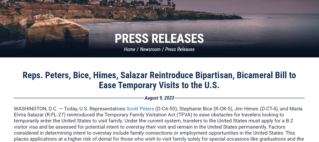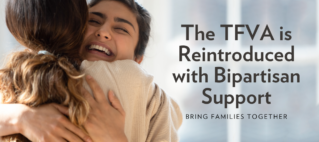
Immigration Small Ball – The Liberal Patriot
The Temporary Family Visitation Act may be incremental immigration reform, but it would be a grand slam for foreign-born MLB players. Jordan Heller | November

In Order to Make it Back to the House of Representatives, this Immigration Bill had to Overcome an Unlikely Obstacle: The State Department – Ideaspace
Jordan Heller | October 23, 2023 Read the original article from Ideaspace Last month, a bipartisan group of U.S. House members reintroduced the Temporary Family

Reps. Peters, Bice, Himes, Salazar Reintroduce Bipartisan, Bicameral Bill to Ease Temporary Visits to the U.S. – Press Release
Representative Scott Peters Press Release | August 9, 2023 Read the original press release here. WASHINGTON, D.C. — Today, U.S. Representatives Scott Peters (D-CA-50), Stephanie Bice (R-OK-5),

The Temporary Family Visitation Act (TFVA) Reintroduced with Bipartisan Support – PAAIA
The Public Affairs Alliance of Iranian Americans (PAAIA) welcomes the reintroduction of the Temporary Family Visitation Act (TFVA) in the House.

Making American visits and vacations possible for all travelers and families – San Jose Spotlight
By Elham Sadri | June 21, 2022 Read the original article here. When President Joe Biden repealed the Muslim travel ban in 2021, the Persian community
Now is the Moment for Action to Unite Jewish Families – Jewish Journal
Jewish Iranian American Elected Official in California Pens Op-Ed on Temporary Family Visitation Act October 12, 2021 Read original version on Jewish Journal website here.
Opinion: It’s time to let U.S. immigrants’ families abroad visit them more easily – San Diego Union-Tribune
PAAIA Board Member Haida Mojdehi Pens Op-Ed on Importance of TFVA October 20, 2021 Read original version on San Diego Union-Tribune website here. By Haida
PAAIA Celebrates Bipartisan, Bicameral Introduction of the Temporary Family Visitation Act – PAAIA
Today, the Public Affairs Alliance of Iranian Americans (PAAIA), a nonprofit, nonpartisan organization serving the interests of the Iranian American community, applauded the introduction of the Temporary Family Visitation Act (TFVA) in the U.S. House of Representatives and the U.S. Senate by a bipartisan team of sponsors.
Paul and Blumenthal Bill would Create Temporary Visas for Families to Reunite – Washington Examiner
A bipartisan group of lawmakers, including Sens. Rand Paul and Richard Blumenthal, introduced a bill on Thursday that aims to make a new category of temporary visas to allow family members to visit the United States for major life events such as weddings, funerals, and births more easily.





























